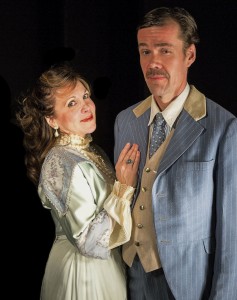Filichia Features: A Little Little Night Music Advice
Filichia Features: A Little Little Night Music Advice
 Send in both the frowns and the crowns for Tom Rowan’s production of A LITTLE NIGHT MUSIC at The Gallery Players in Brooklyn.
Send in both the frowns and the crowns for Tom Rowan’s production of A LITTLE NIGHT MUSIC at The Gallery Players in Brooklyn.
If you don’t know Stephen Sondheim and Hugh Wheeler’s 1973 Best Musical Tony-winner, time has come for you to make its acquaintance. We’re in 1900 Sweden, where middle-aged lawyer Fredrik Egerman married barely legal teenager Anne nearly a year ago.
But the union still hasn’t been consummated.
Eventually Anne will leave Fredrik for his son 19-year-old son Henrik, which will allow Fredrik to return to actress Desiree Armfeldt, whom he (unknowingly) impregnated 14 years earlier. He and Desiree will now live with their daughter Fredrika, for Desiree will drop her lover Carl-Magnus, who might well return to his wife Charlotte (for a while). No wonder that with complications such as these, Desiree sings “Send in the Clowns” to comment on all their lives.
As usual, Rowan started the show as original director Hal Prince did – with a quartet singing selections from the score and creating an “Overture.” I’ve said it before and I’ll say it again: PLEASE use a projection that says “Overture” so that your audience won’t be confused. Theatergoers have every right to assume that these five people are major characters with whom they’ll deal all night long. To hear them sing “Soon, I promise; soon, I won’t shy away” can only lead to some serious head-scratching confusion. Who’s promising to not shy away – and from what?
The next time we hear that line occurs after Fredrik has established that he and his young wife haven’t yet made love. Now we know that “Soon, I promise” is her giving him hope that he’ll experience a nice night.
Fredrik’s opening song – “Now” – has him wonder if he should give Anne a book or two that might get her in the mood. He comes to the conclusion that many would be beyond her sexual ken. “Is Hans Christian Andersen ever risqué?” he quips.
Quips. That’s the important word. Here Rowan actually had Anne reading a book whose cover revealed that its author was Hans Christian Andersen. That’s overkill. Sondheim didn't mean Fredrik to be that literal and was purposely having him exaggerate.
Off to the theater Fredrik and Anne went to see “the one and only Desiree Armfeldt” in the hit comedy Woman of the World.” When she made her first entrance on stage, Rowan immediately had Fredrik rise to give her a standing ovation. I say no – and not because standing ovations weren’t common in Sweden at the turn of the 19th century. Fredrik would have worried that such a gesture would have tipped off his young bride that he and Desiree had once consorted.
In fact, all it took was a knowing glance from Desiree to Fredrik for Anne to become unnerved if not suspicious. Once she demanded “I want to go home!” and left, Rowan made a good choice in having Fredrik stay in his chair lost in nostalgic thought; Anne had to pull him away or he might be sitting there still.
That would, however, have saved him a trip back to the theater where he hoped that Desiree would bed him. Indeed she would, although she’d been seeing the aforementioned Carl-Magnus, a butch soldier who was always ready to duel at a moment’s notice. Hence Desiree’s opinion that he has "the brain of a pea."
After Fredrik and Desiree finished trysting, Carl-Magnus unexpectedly arrives, so Fredrik has to invent a hurried explanation. Most Fredriks try to sound matter-of-fact in their fabricated stories, but Rowan had his Fredrik over-elaborately explain what he and Desiree hadn’t been doing.
Even someone with a pea-brain would have seen through it. Directors, you must be careful in how you direct your characters who lie. Don’t make the mistake of having the performer pause and then say “uh,” and “ah” between sentences, or have them snap their fingers when they’ve come up with what they believe to be a convincing lie. Yes, this approach does get a little laugh or two out of some of your audience, but look at it this way: in your life, if someone paused and then said “uh,” and “ah” between sentences while explaining something to you, wouldn’t you catch on that he was lying? So would any character, even if his brain were pea-sized.
This next piece of advice is hardly make-or-break, but when you audition your potential Carl Magni, take time to see how well they whistle. Although A Little Night Music's composer-lyricist had asserted nine years earlier that "anyone can whistle," some can do it better than others and Carl-Magnus is supposed to excel at it. Here Rob Langeder did.
After Carl-Magnus sang that women are "a functional but ornamental -- race," Langeder squinted as if to say "Is that the right word?" before shaking his head as if to say, "No, that isn't right" and as if to clear his head of the thought. Good for him or Rowan for discovering this subtlety.
The director got the right girlish glee from both Emily Stokes’ Anne and her maid Petra (the admirable Kiley Caughey). The two young women bonded so well that the audience had no trouble believing that Anne would reveal to her maid that she was still a virgin. That prompted Caughey to say "I know" with sadness. (In King Lear, it's the Fool who's smart; in Night Music, it's Petra.)
Petra’s reaction helped to get Anne to the next step where she’d take pause and wonder. Was her virginity that obvious? Was she unnerved that she was coming across to people as less of a woman and more of a girl – to the point where even her so-called inferior could tell? And by retaining her virginity, was she really missing something?
Anne couldn’t ruminate on this for long, for Charlotte was at the door. Rowan made a remarkable move here, thanks to an ornate dressing screen he’d placed upstage. When Anne and Petra went to greet Charlotte, they were still two silly schoolgirlish teens as they approached the screen and walked behind it; however, seconds later when they emerged from the other side, they had fully composed themselves. Now Anne was the elegant lady of the house while Petra was the dutiful and subservient servant.
Never in my 13 visits to Night Music (including its first-ever performance in Boston) have I seen an Anne as shattered as Emily Stokes when Charlotte told her that Fredrik had been with Desiree. Some time later, when the engraved invitation arrived and Anne saw that it came from the Armfeldt family manse, her "Oh, no!" was not the wounded shriek that Victoria Mallory gives on the original cast album. This Anne had grown up in a hurry and was more resigned. She seemed to be saying "Ah. As I feared. As I suspected. As I knew." This made the audience feel bad for her.
NIGHT MUSIC teaches the valuable lesson that certain people are right for you and certain people are not. Anne isn’t frigid; she just couldn’t see herself being that intimate with someone whom she regarded more as a father figure. The mistake was really Fredrik’s; he should have known better, but fooled himself into thinking that he could inspire lust in a very young woman.
When Desiree told Fredrik that her daughter's name was Fredrika, Richard Rowan (yes, the director’s brother) immediately expressed fear instead of the usual cocksure pride that he’d fathered a child.
Good! But in the scene at the Armfedlts in which Henrik becomes incensed and flings one of the expensive goblets, Rowan had him throw it offstage. No; let’s see the tangible result of his frustrated temper. Yes, cleaning up shards of glass from the stage will mean more work for the Armfeldt maid, but good drama must come first in any show.
Rita Rehn and Rowan had a fine take on Desiree. She was artificial when playing her role in Woman of the World and was still playing games with Fredrik right up to the "Send in the Clowns" scene. That’s when all the superficiality disappeared as Rehn stripped away the façade and became totally honest with the man she loved. The contrast between the two different personalities made for a dazzling achievement.
As her mother Madame Armfeldt, Judith Anna Roberts made "liaisons" and "raisins" into a perfect rhyme. Make sure that the actress playing your dowager does, too. For that matter, lean on everyone in your cast to enunciate. Sondheim’s music isn’t just relegated to notes on a staff; his lyrics create a little night music of their own, too.
 You may e-mail Peter at pfilichia@aol.com. Check out his weekly column each Tuesday at www.masterworksbroadway.com and each Friday at www.kritzerland.com. His new book, Strippers, Showgirls, and Sharks – a Very Opinionated History of the Broadway Musicals That Did Not Win the Tony Award is now available at www.amazon.com.
You may e-mail Peter at pfilichia@aol.com. Check out his weekly column each Tuesday at www.masterworksbroadway.com and each Friday at www.kritzerland.com. His new book, Strippers, Showgirls, and Sharks – a Very Opinionated History of the Broadway Musicals That Did Not Win the Tony Award is now available at www.amazon.com.


























